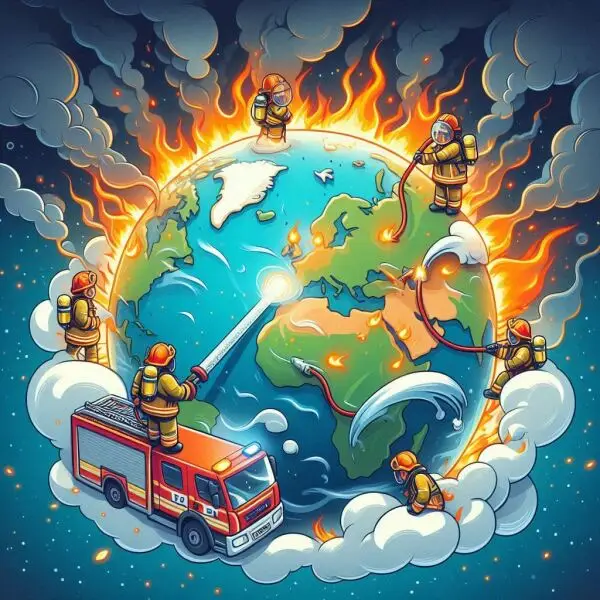Microscopic fossils allow us to know how to combat global warming
Microscopic fossils reveal how ancient global warming events, linked to volcanic activity, help to understand current climate change....
Table of Contents
- The Impact of Hyperthermal Periods on Current Climate Change
- The Relationship between Sea Temperatures and CO2
- Fossils as Indicators of Climate Change
- Lessons for the Future
Follow Patricia Alegsa on Pinterest!
The Impact of Hyperthermal Periods on Current Climate Change
A recent study reveals that the hyperthermal periods that occurred millions of years ago, particularly during the Paleocene and Eocene, offer valuable information to understand current climate change induced by human activity.
These events, characterized by dramatic increases in global temperatures, are linked to massive volcanic eruptions that released large amounts of carbon dioxide (CO2) into the atmosphere.
This knowledge is crucial for predicting the consequences of contemporary global warming.
NASA allows us to see in real-time from satellites the fires around the planet Earth
The research published in the journal Proceedings of the National Academy of Sciences highlights the correlation between sea temperature and CO2 levels in the atmosphere.
NASA allows us to see in real-time from satellites the fires around the planet Earth
The Relationship between Sea Temperatures and CO2
The research published in the journal Proceedings of the National Academy of Sciences highlights the correlation between sea temperature and CO2 levels in the atmosphere.
During the Paleocene-Eocene Thermal Maximum (PETM) and Eocene 2 (ETM-2), significant increases in global average temperature were observed, resulting in the extinction of multiple species.
This study uses foraminiferal fossils to reconstruct the climatic conditions of the time, allowing scientists to establish patterns that could be repeated in the future.
Los foraminíferos, unicellular organisms that inhabited the oceans, have been fundamental in the research of past climate.
Fossils as Indicators of Climate Change
Los foraminíferos, unicellular organisms that inhabited the oceans, have been fundamental in the research of past climate.
By analyzing the boron chemistry in their shells, scientists can infer atmospheric CO2 levels from millions of years ago.
According to Dustin Harper, the lead author of the study, “measuring the boron chemistry of the shells allows us to translate those values to past sea water conditions, providing a window into Earth’s climatic history.”
Despite current CO2 emissions being 4 to 10 times faster than those released by volcanoes in the past, the total amount of greenhouse gases generated is comparable.
Lessons for the Future
Despite current CO2 emissions being 4 to 10 times faster than those released by volcanoes in the past, the total amount of greenhouse gases generated is comparable.
Understanding hyperthermal events of the past is essential to foresee the future of the climate and prepare humanity for imminent environmental changes.
Researchers like Harper emphasize the importance of studying these periods to identify how the Earth might respond to the accelerated release of carbon, which could have significant implications for our climate change mitigation strategies.

Subscribe to the free weekly horoscope
Aquarius Aries Cancer Capricorn Gemini Leo Libra Pisces Sagittarius Scorpio Taurus Virgo
-
 Can AI collapse? Experts warn about its dangers and solutions
Can AI collapse? Experts warn about its dangers and solutions
Why can generative AI self-destruct? Discover recent studies that alert about its degradation and the experts who analyze possible solutions. -
 Discover a group of chimpanzees with culture and tools like humans
Discover a group of chimpanzees with culture and tools like humans
Chimpanzees in Africa exhibit culture similar to humans: they use tools and adapt methods according to their environment, revealing cultural transmission. -
 Lost dogs: how do they manage to navigate and return to their homes?
Lost dogs: how do they manage to navigate and return to their homes?
Lost Dogs: Masters of the Return. Surprisingly, some find their way home after traveling miles. Science remains intrigued. -
 Who is Nassim Si Ahmed: the heartthrob of the new Netflix movie
Who is Nassim Si Ahmed: the heartthrob of the new Netflix movie
The French actor Nassim Si Ahmed has captivated the audience in the recent movie released on Netflix. Find out who he is. -
 Where do cats go when they go outside? A study reveals their secrets
Where do cats go when they go outside? A study reveals their secrets
Have you ever wondered where cats go when they go outside? A study in Norway tracked 92 felines with GPS and revealed their destinations. Discover the findings in Nature.
I am Patricia Alegsa
I have been writing horoscope and self-help articles professionally for over 20 years.
Subscribe to the free weekly horoscope
Receive weekly in your email the horoscope and our new articles on love, family, work, dreams and more news. We do NOT send spam.
Astral and numerological analysis
-
 Discover your future, secret personality traits and how to improve in love, business and life in general
Discover your future, secret personality traits and how to improve in love, business and life in general
-
 Online Dream Interpreter: with artificial intelligence
Do you want to know what a dream you had means? Discover the power of understanding your dreams with our advanced online dream interpreter using artificial intelligence that responds to you in seconds.
Online Dream Interpreter: with artificial intelligence
Do you want to know what a dream you had means? Discover the power of understanding your dreams with our advanced online dream interpreter using artificial intelligence that responds to you in seconds.
-
 Former prime minister accused of murdering his wife: chilling video
Former prime minister accused of murdering his wife: chilling video
Former Prime Minister Kuandyk Bishimbayev is accused of beating his wife, Saltanat Nukenova, to death during an argument at a restaurant. Security camera footage has been released. -
 Revolutionary advance: Early diagnosis of memory loss in older people
Revolutionary advance: Early diagnosis of memory loss in older people
Researchers from Mayo Clinic have discovered a breakthrough regarding memory loss in older adults, affecting the limbic system. Exclusive details in Infobae. -
 The viral photograph that defies logic! Where is the woman's head?
The viral photograph that defies logic! Where is the woman's head?
A photograph that has gone viral in recent days shows a headless woman in what appears to be a beauty salon: Where is her head? -
 Revealing the Shocking End of the Pharaoh Ramses III: He Was Murdered
Revealing the Shocking End of the Pharaoh Ramses III: He Was Murdered
Scientists reveal, through advanced technology, the astonishing end of the life of the famous pharaoh, uncovering surprising historical twists. -
 Scandalous fight at a Bad Bunny concert!
Scandalous fight at a Bad Bunny concert!
A scandalous fight broke out while singer Bad Bunny was performing live at one of his concerts in the United States. -
 Goodbye antibiotics! Vaccines and bacteria ally in your gut
Goodbye antibiotics! Vaccines and bacteria ally in your gut
A revolution in the gut! Oral vaccines and good bacteria join forces to fight infections without antibiotics. Goodbye, pills; hello, natural health. -
 Significant scientific advance in Alzheimer detection techniques
Significant scientific advance in Alzheimer detection techniques
More accurate results than cognitive tests and CT scans in primary care. Findings that could facilitate accessible detection of the disease. -
 What does it mean to dream of hieroglyphics?
What does it mean to dream of hieroglyphics?
Have you ever wondered what it means to dream of hieroglyphics? Discover in our article the interpretation of this dream and its meaning in different contexts, don't miss it! -
 Unleash the passion with the sexual secret according to your zodiac sign
Unleash the passion with the sexual secret according to your zodiac sign
Unveil the sexual secret that will drive your partner crazy according to her zodiac sign. Surprise her and enjoy new experiences together! -
 What does it mean to dream of necklaces?
What does it mean to dream of necklaces?
Discover the meaning behind your dreams with necklaces. Do they represent emotional ties or do you feel trapped? Find the answers in our article. -
 What does it mean to dream of walking?
What does it mean to dream of walking?
Discover the hidden meaning behind the dreams in which you wander. Do you feel lost or free? Find out what your mind is telling you - read more here! -
 The most common lies according to your zodiac sign
The most common lies according to your zodiac sign
Discover the most common lies told by each Zodiac sign - don't miss it! -
 10 lessons they teach you about casual relationships
10 lessons they teach you about casual relationships
Discover how to transform your short-term relationships into valuable lessons of love. This article will guide you towards more fulfilling and meaningful relationships!